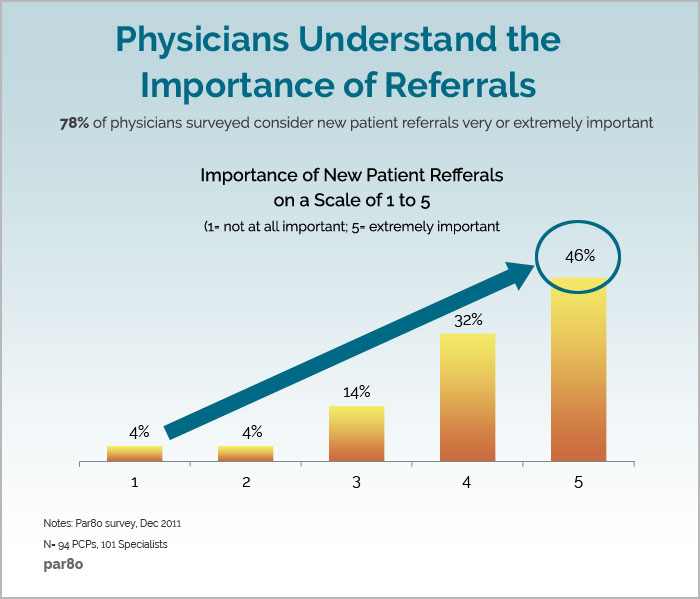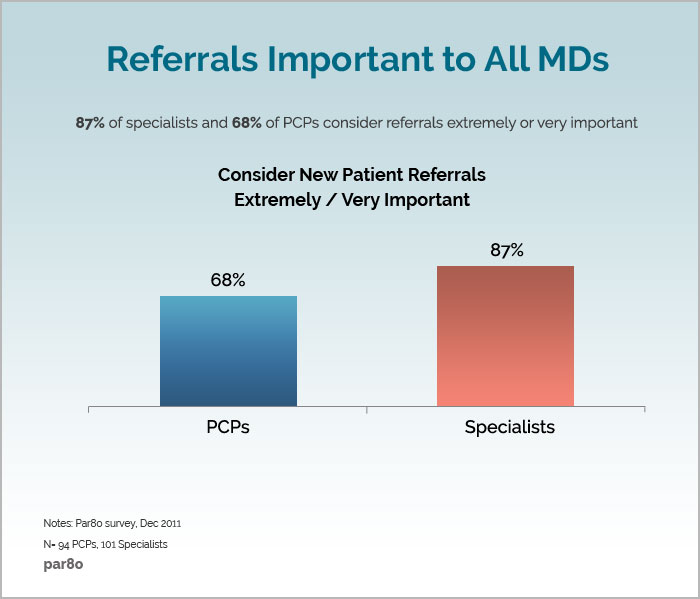Ultimate Guide to Patient Referral Marketing
Posted on
Developing a strong referral network is critical to ensuring the success of your medical practice. In order to grow your medical practice’s revenue, it is important to attract new patients consistently. In addition to advertising and connecting with insurance agencies, establishing a reliable referral network is an excellent way to bring in new business.
However, as healthcare practices merge and consolidate, it can be tough for small practices to build and nurture referral relationships. Moreover, even if a referral channel is set up, sustaining it becomes a challenge. While you may be playing your role well by referring patients to specialists, you need to make sure other doctors are returning the favor by referring their patients to you. This is where networking plays an integral part as other doctors will only feel comfortable referring patients to your practice if they trust you. The more well-known your practice is, the more likely other doctors will refer patients to you.

What drives physician referrals?
In the last decade or so, the rate at which doctors have referred patients to a specialist has more than doubled. Professional referrals have not grown just because doctors want to expand their practice, but for a multitude of various factors that drive physicians’ decisions. The following are some of the points that are contributing to the increased referral rate:

- Too few doctors: There is a shortage of primary-care physicians in the United States, which means they lack the time and resources to pay attention to patients with complex illness. So rather than decreasing the quality of patient care in order to maximize revenue to balance expenses, these patients are referred to specialists who have sufficient resources for handling their complex symptoms. According to published reports, the availability of primary-care physicians is not going to improve for the next few years at least. Therefore, in the years to come, the rate of professional referrals will grow as physician availability declines.
- Fear of malpractice: Recent studies have revealed physicians’ constant worry over malpractice. This concern is one of the strongest drivers behind requesting lab tests and referrals. According to a study, physicians’ fears of being sued for malpractice are disproportionate to the risk of being sued. But as long as malpractice remains a concern for physicians, it will influence their referral patterns. Also, patients often demand to be referred to a specialist. In the past, a patient with shoulder pain might be told to take a Motrin and wait for a few days. However, now the patient demands to be referred to a neurologist. So, a larger portion of referrals is coming from patient requests as well.
- Keeping the patient satisfied: Patients are more informed today than they were a decade ago. Healthcare websites, online reviews and heaps of online information have increased patients’ role in their healthcare decisions. Some patients even walk in to the physician’s office determined what specialist they want to be referred to. In such cases, in order to make the patients happy, the physician usually refers them to the desired specialist.

Why do you need professional referrals?
Studies show that referral marketing can trigger the growth of your medical practice. Moreover, that is what doctors want. Industry experts believe that referred patients tend to be more loyal and profitable than regular patients. This means that getting including a referral program in your marketing strategy toolbox is essential for every medical practice.
While there are many more reasons to consider a physician referral program for growing your practice, here are three primary ones:
- Attract new patients: The most significant benefit of a physician referral program is that it creates a continuous stream of new patients. Your patients will come looking for you rather than you having to find them.
- Increase brand recognition: Once your referral sources start referring patients to your practice, brand recognition is an apparent benefit. The more happy patients you will have, the more personal referrals you will get. This will result in increased traffic through your practice website and social media profiles. All of this is bound to boost your brand’s image.
- Higher ROI: Online networking, eNewsletters, online discussion groups and social media groups have made it easier for smaller practices to promote themselves and become a trusted source. These referrals programs have considerably higher ROI than traditional marketing methods.
Some valuable tips to get you started
Physician referrals are a critical component in growing your practice and attracting new patients. However, just waiting for patients and other doctors to refer to you might not be sufficient for filling your appointment book. You will have to go after them.

Here are some expert tips for small medical practices that are looking to establish, maintain and strengthen their referral relationships:
Create a plan and adhere to it: You will need to create a plan or work in close collaboration with a healthcare marketing expert to help you design a referral marketing plan and then execute it. It is critical that you have perseverance, discipline and trust in the plan. Many practices expect instant results from such plans. You must understand that developing a referral network is a process and not an event. An effective referral marketing plan requires time and effort. Too often, practices change their priorities or suspend their referral-building plans before they have time to yield results.
Adopt technology: In the healthcare business, you must be technologically savvy in order to share electronic information with networking doctors for improving efficiencies and delivering better patient care. The ideal solution for hosting and sharing patient-related information is cloud-based. This solution will not only allow the physician to receive referrals electronically but will also streamline the referral process and eliminate paperwork.
Communicate often: You will need to keep communication channels open for your referrers to discuss any patient-related issues. This will improve the quality of patient care and support your relationship with the referring doctors.
Know your target audience: The most important criteria for building patient volume is your practice’s specialty. For instance, growing a primary-care practice requires a patient-friendly approach, while creating a dermatology practice requires a targeted approach to physician referrers.

Welcome new physicians: You must have a plan to contact and welcome any new doctors in your area. You can call, write a personal letter of introduction and provide your contact details. You can also offer to serve as a resource and a friend, whether for professional or family needs.
Meet your referrers: When you are looking to increase your referrals, a face-to-face meeting with the referring physician can make a huge difference in enhancing your relationship. Also, networking and maintaining cordial relationships with the referring physician’s staff is a good way to increase the number of referrals.
Advertise your practice: You must advertise and promote your practice locally and make yourself available. Join your local medical societies and chambers of commerce, and become known. In order to determine your largest resource pool, keep track of where your maximum ROI comes from and invest efforts in enhancing it accordingly. Network with other medical practitioners as they may turn out to be sources of referrals.
Keep the referring doctor informed: Usually, referral doctors want to work with specialists who do not require constant follow-up on paperwork or the patient’s treatment. Also, providing excellent patient care makes the referral doctor’s life easier because they will not need to see the same patient again.

Re-evaluate and revamp relationships: This is the most important part – to regularly evaluate and update your relationships with referral sources. To be successful in a referral marketing programs, you have to be aware of the changes occurring around you. For instance, what may have been a good referral plan in dermatology three years ago may not be suitable today as facilities and equipment change.
Avoid these mistakes
The quality of your referral network can impact your income, patient experience, information security and your medical career. That is why it is critical to building a strong referral network from the very beginning. Moreover, once you have established your referral network, you must maintain and upgrade it regularly. Just a few mistakes can damage the reputation of your medical practice. Here are some of those mistakes:
- Not monitoring patient satisfaction: While there are various ways to control the health of your referral network, patient satisfaction is one of the most important ones. Just because your patients are interacting with other healthcare providers as well, you should not stop monitoring their satisfaction. The more satisfied your patients are, the less chance of you being involved in a lawsuit.
- Choosing challenging referral partners: This is an easy mistake to make. If you are not careful and selective while choosing your referral partners, you could find yourself neck deep in a sea of unhappy patients and bad partner relationships. It may seem tempting to sign on with any provider with good reviews, but you must spend some time getting to know them and their practice. If you are looking to form long-term partnerships, find partners who have similar goals and target audiences.
- Poor communication: Communication is the foundation of the patient experience. Patients want to feel cared for and welcome, and not that they are being shuffled from one office to another. Therefore, it is critical to have rules around your communications. Your staff should be trained to communicate effectively, and they should be regularly evaluated.
- Listen to your patients: You must manage their expectations around the referral process right from the beginning and make sure their doubts and questions are resolved. Patients expect smooth and flawless communication from their providers, and you must make the effort to live up to this expectation.
Even if you think your medical practice is doing well and that a physician referral program is a waste of time, think again! Your medical practice is a business, and it is critical that you think of the future. You must implement a systematic method to identify, create and maintain healthy relationships with prospective referrals.
At Practice Builders, our referral development experts will ensure your referral network is giving you the best-quality patients rather than an office full of low-quality patients. You can call us to take advantage a free referral marketing evaluation for your medical practice.

 Why Good communication Matters in Healthcare
Why Good communication Matters in Healthcare De-Escalation Tips for Handling Aggressive Patient..
De-Escalation Tips for Handling Aggressive Patient.. Reaching The Right Audience Through Target Marketi..
Reaching The Right Audience Through Target Marketi..